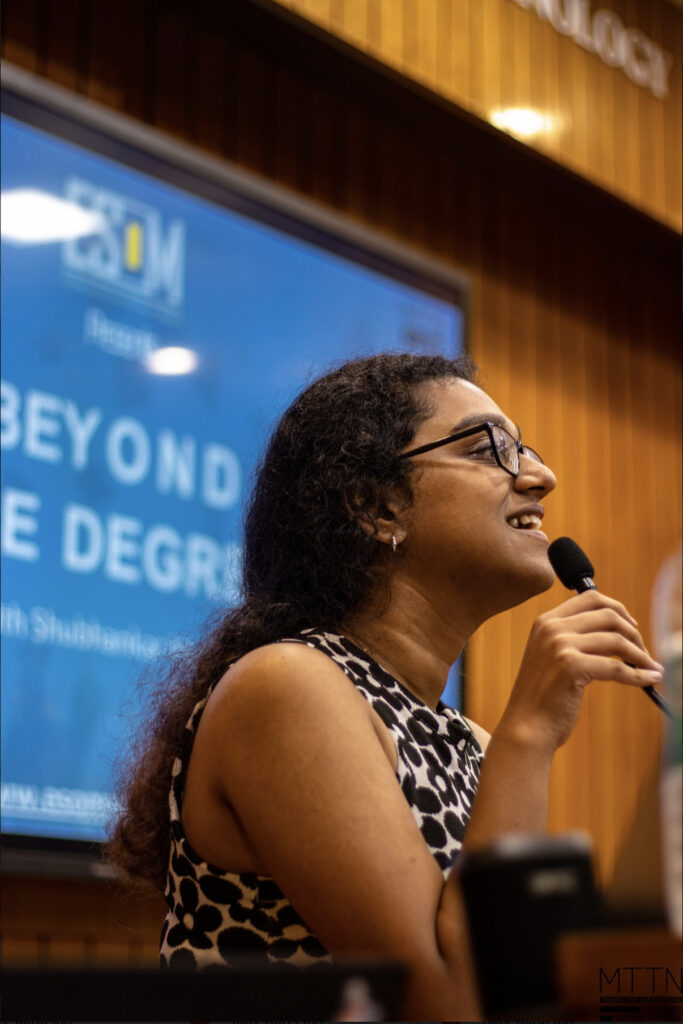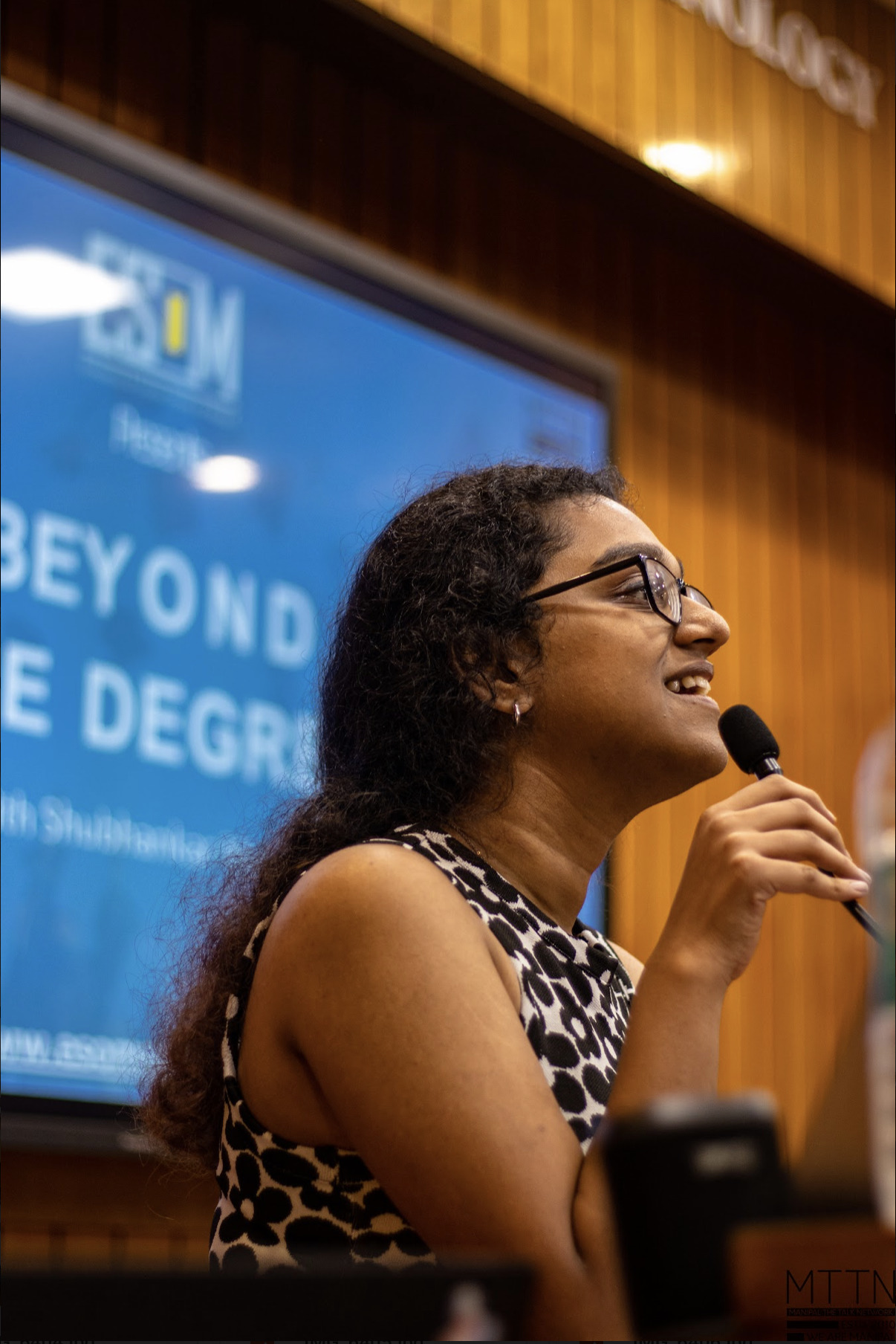
On 28th August 2022, the Economics and Finance Society of Manipal (ESOM) hosted a hybrid webinar and Q&A session, “Beyond the Degree,” at the MV Seminar Hall.
ESOM strives to enhance the general understanding and awareness of Economics and Finance throughout the student community. They conduct various events and workshops like this throughout the year while also helping members showcase what they’ve learned.
With spirits at an all-time high and the auditorium seats filling up, students awaited the speaker’s arrival. Besides being a Manipal alumnus and an excellent orator, Shubhankar is currently working as a summer analyst at Barclays, London.
The Crowd’s Expectations From the Event
“The speaker pursued Mechanical Engineering From MIT, Manipal and pursued a career in finance later on in life, which is why I came here on a Sunday afternoon to know more“. ESOM acted as the facilitator, linking Shubhankar to students with similar aspirations. The general crowd consensus for attending the event was just an opportunity to learn more about finance. These students either wish to pursue a different career path or would like to have a slice of what makes markets.
MIT’s role in shaping his journey :
“MIT was a mini-B-school in itself.“
Since people here are more comfortable doing what they want to do and are not solely academically inclined, Shubhankar had an excellent foundation to begin with. The Alumni network built here is highly skilled, which is why he still speaks highly of the college.
Internship with Mercedes Benz :
“I had to continuously write emails to get in. Once I was in, the work ethic was very strenuous. Everyone has the same 24 hours.“
This was an internship that Shubhankar took up as a challenge. Realising that such time allocation directed towards one aspect was not for him, he decided to move on to other opportunities.
CGPA and Success
“CGPA has not played a part” although he does believe it’s beneficial to have a good GPA, once you can convey you’ve been involved and can be a part of something holistic, that’s all that matters. “Anything that shows you were responsible for solving an issue is essential to employers.“
As long as you can show them your GMAT score, he adds that you don’t need an exceptional GPA for anything in life.
“People remember people who make their jobs easier” if you want to differentiate yourself, put in the effort initially and show people you are ready to learn.
Experience at Goldman Sachs :
His primary approach to placements was practising aptitude questions. “I had applied for everything that was not related to engineering. Goldman Sachs and other big companies want to test your holistic approach, your attitude about solving tasks and not just your academics.” While also believing that luck was an essential factor, Shubhankar encouraged the crowd to integrate all spheres of learning. “Once you are into such big firms, they don’t want you to fail.” Shubhankar found a strong Manipal network after joining Goldman Sachs.
Shubhankar’s advice to students summarised:
- You always take chances and learn. Don’t shy away from challenges.
- Don’t run away from coding.
- Know Excel.
- Do anything that helps with automation.
- Make networks to make networks.
- Be Genuine; only talk about things that you really know about.
When you start out, you must reach out to people and ask for help, which is a better proposition for the firm and also what they want from the candidate. Stay in touch with people and organically build relationships.
Experience at London Business School :
This is where Manipal helps. Manipal makes you an extrovert. He says this, to draw a parallel between making friends in college and networking professionally later on in life. In a new country, if you can make friends, you have what it takes to succeed. However, you have to start from scratch to prove yourself. “Your Network is always your real return on investment.“
About B-schools: The schools abroad don’t want you to do something path-breaking to be there; they just want to hear something that would make you an exemplary alumnus.
“If you want to have a job that pays well, you must learn to compromise.“
Your goals require a specific background. Reverse Engineering your goals, and that’s how you know what colleges you can choose.
Experience at Barclays :
“Learned a lot at Barclays, although they didn’t expect you to know anything in particular initially.“
Before getting shortlisted by Barclays, Shubhankar applied to 26 banks, some never heard of before. The only technical questions he got from their end were from his own investment portfolio.
About Barclays—”You never get a full-time offer here unless you’ve worked significantly before.”
For companies like Barclays, you must keep at it for months after getting an internship, and eventually, that gets converted to a full-time offer.
Barclays because:
- It’s in the UK.
- It’s a big name.
- When it comes to credit, Barclays is a leader.
This is why reverse engineering becomes important. If you want to work with credit, you know Barclays is the place to be.
We also got to hear a couple of words from Shubhankar’s dad on his career choices: “He knew what he wanted to do, so we never had any doubts about it.”
On an ending note, Shubhankar said, “Don’t do it for your CV, do it for the experience.”
After bringing the insightful conversation with the speaker to an end, ESOM had something planned for the audience. They later announced that they had placed coupons randomly under some of the chairs that the students could keep once located. Additionally, they gave everyone who attended another coupon as a gesture on the way out.
Hence, besides the knowledge they gathered, the attendees had a momento to keep with them—the event was rewarding in its true sense.
Written by Aayush Niraj for MTTN
Images by Vaibhav Sharma for MTTN

Leave a Reply
You must be logged in to post a comment.